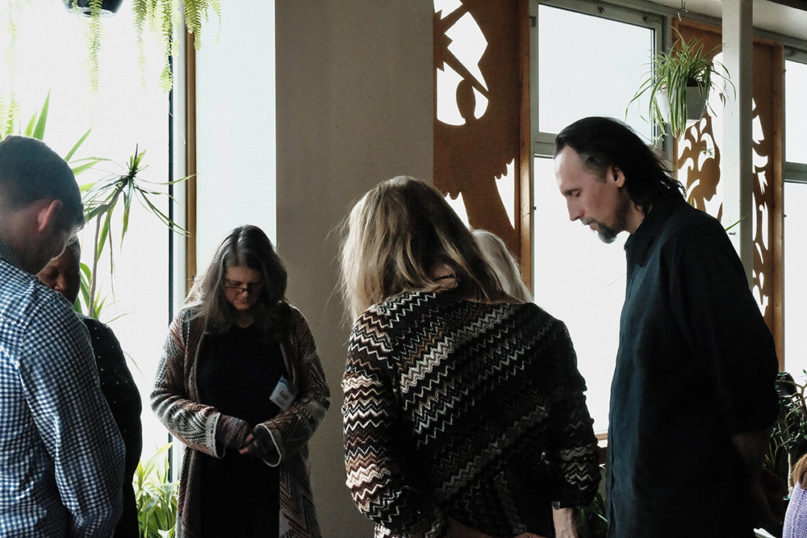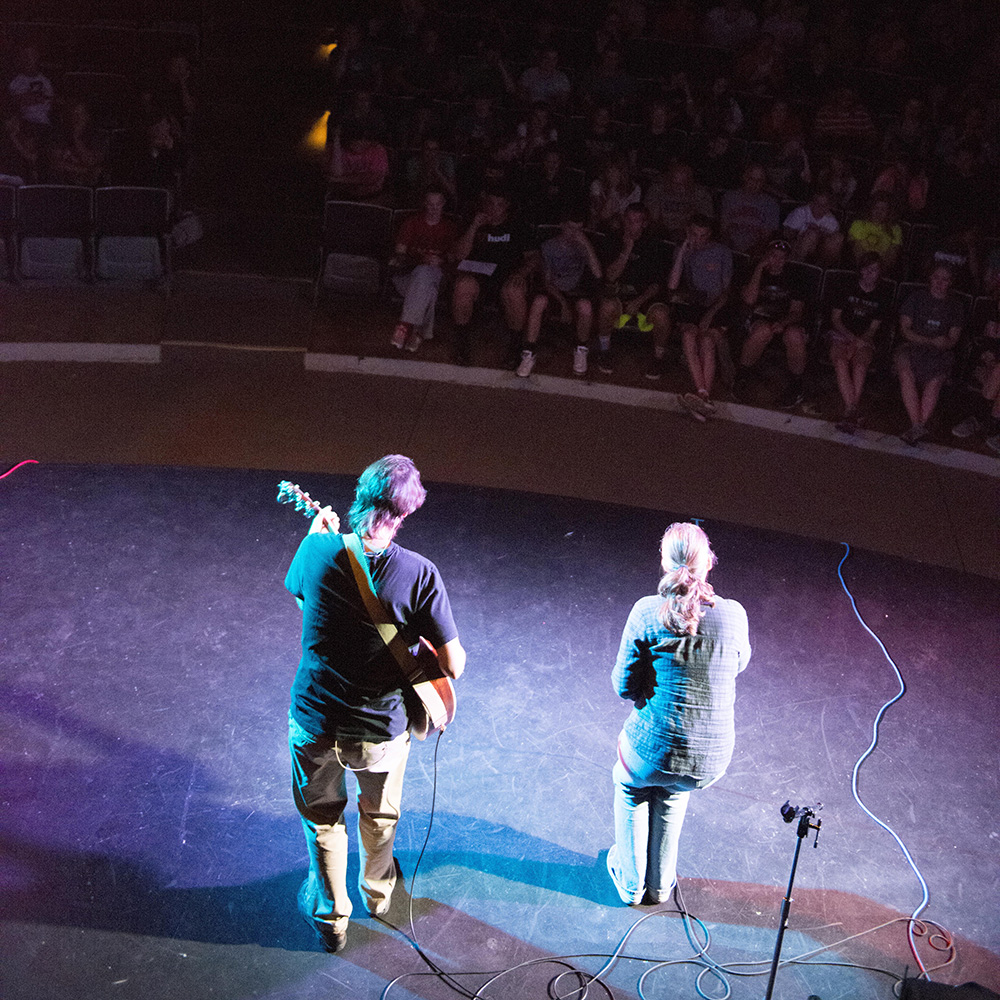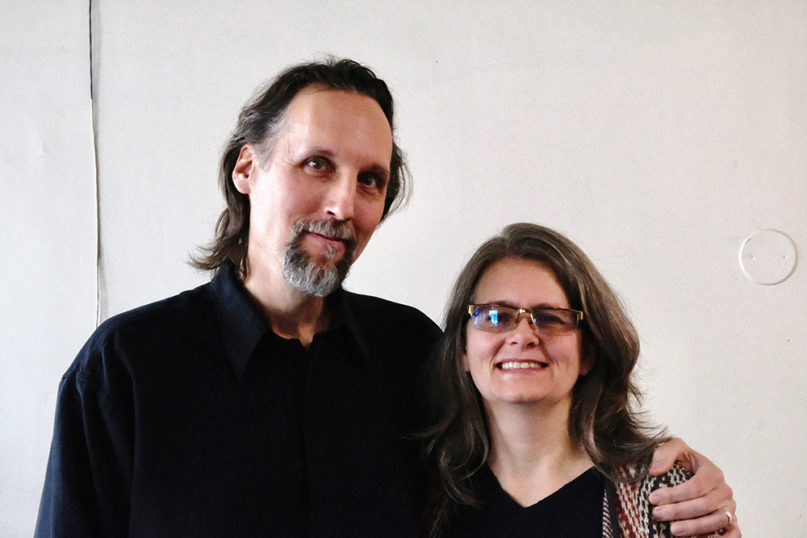Part two:
CHICAGO (RNS) Al Tauber waits beneath the elevated tracks at the Belmont station, a brightly-lit hub on Chicago’s north side.
It’s almost midnight on a January Wednesday, and Al wears a black knit cap, jeans and a black winter coat.
He greets Daniel Howard, a young seminary student who’s joining him on a night of outreach and hands him a couple of packets of disposable hand-warmers to slip in his pockets. It’s 33 degrees and snow is on the way. Al asks Daniel to start off with a prayer, and they close their eyes and stand with bowed heads beneath the train tracks.
“Lord, just bless our time,” Daniel said. “We pray that you would just bring people to us tonight.”
The people they want God to bring are prostitutes.
The two are doing outreach for Emmaus Ministries, a faith-based nonprofit, which tries to help sexually-exploited men — prostitutes and victims of sex trafficking — get off the streets and bring them to Jesus.
Daniel and Al leave the brightly-lit station and head east, past comedy clubs, and late-night restaurants. Clusters of smooth-faced, fashionably-dressed men and women pass by on the sidewalk.
An icy wind blows down the street, and the air smells like hot dogs and pot and Lake Michigan, looming out there in the dark a few blocks away. They head to Halsted Street and a line of popular bars in “Boystown,” the hub of Chicago’s historic gay community.
Al’s been doing outreach here almost every week for 15 years.
The men he’s looking for aren’t in the bars; they’re lingering on street corners, alleys, and convenience store parking lots.
Outside a club known for strong drinks and show-tune singalongs, Al sees a familiar face, a young man with apple cheeks and a shy grin who stands with his hands in his pockets.
He’s not an Emmaus regular, but they’re pretty sure he’s hustling. Al steps beside him and smokes a pipe as he chats with the young man. A sweet tobacco aroma rises around them.
Al offers him hand warmers, asks after his job and family, asks if he’s seen any other guys out here tonight. When a man nearby announces he’s selling coke, Al hands him some hand warmers too, along with a few business cards. He explains his ministry works with male prostitutes, and he asks him to pass them along to anyone who might need them.
In time, Al and Daniel move along, toward the parking lot of a 7-11, looking for more guys.
They don’t carry Bibles or religious tracts. In his backpack, Al’s got granola bars, warm knit caps, and a dose of Narcan, in case he meets anyone who’s OD’ed. He hasn’t had to use it yet, he said. He’s also got more of those business cards, with the ministry’s address and phone number.
The road
Scott Noble remembers seeing those Emmaus outreach teams many times. He just wanted them to go away. Now, he commands the spotless kitchen at the ministry center, frying up a pan of ground beef. Scott is 53, has a thin mustache and dimples. Wears a black apron and plaid shirt on over his trim frame. Scott grew up on the South Side of Chicago; his father wouldn’t accept him, leading him to run away away from home at 16.
He eventually started using crack; it took years for the Emmaus folks to coax him off the streets.
“I kept running into them; I kept dodging them,” Scott said. “But then one day, I was just like, look: I keep seeing you people out here. What do you got to offer me? I’m at the end. You know? So that’s the beginning. Then I started coming around.”
He stood by the stove, slicing up a potato, and told me about the good he’s seen Al and Andi do.
“Going on hospital visits. Care packages. Prayer. They remember your birthday. Jail visits. Just a lot of things that sometimes a person needs,” Scott said. “Just somebody to say everything’s going to be all right. Or somebody saying, you taught me a lot.”
God’s still working on him, Scott says.

Andi Tauber, center left, and her husband Al, right, pray before a Sunday morning worship service at Living Water Community Church in Chicago, a largely immigrant, urban Mennonite congregation. Photo by Jules Wecker
Many of Emmaus’ staff and supporters take what they’d call a traditional, biblical view of sexuality: that marriage is between one man and one woman, for life. They’re not out to convert anyone – this isn’t a place to “pray the gay away.”
To appease their Catholic supporters, including the Archdiocese of Chicago, Emmaus staff don’t hand out condoms as part of their street ministry. They don’t fly a rainbow flag out front. But as much as they can, they try to steer clear of the culture war within Christianity – that battle over sexuality and sin that’s splitting the United Methodist Church. Al says there’s space here for different views; they just want everyone to feel loved.
Scott identifies as gay. As he cooked lunch that day, I asked him what his faith says about it. He told me some of the Emmaus guys end up marrying women. He wonders if they’re happy. He stared at the spaghetti sauce for a while.
“Would I want to be straight? Probably. I don’t know,” he said.
Scott cooks a hot lunch twice a week at the ministry center; he sets the food out on a long table in the church basement, beneath a painting of a dark-skinned Jesus breaking bread with his disciples. The meal starts with a reading from Scripture and a prayer.
A client named Enrique read from the Bible that day. He’s known Al and Andi for years.
“They’ve seen me at my best and at my worst,” he says. “ They’ve always helped out as much as they could.”
I asked Enrique what Al, Andi and the ministry mean to him. He answers first in Spanish: “Amor,” he says.“Love. A place where you can come and actually talk to someone and express an idea. Or maybe that day you go and somebody gives you a handshake, and you feel good about somebody giving you a handshake or a hug.”
As Al sees it, that family-style meal is the center of Emmaus’ ministry.
“We model our ministry after the story of Jesus walking on the road to Emmaus,” a town outside Jerusalem, Al says. Historians aren’t quite sure where exactly. In the story, which takes place right after the crucifixion, Jesus meets two disciples who don’t realize it’s him. They’re “at the worst, lowest point of their life. They’ve basically lost everything,” Al says. “Jesus meets them on the road. He listens to them. He asks them questions.”
“They eventually get where they’re going,” Al continued. “And he acts as if he’s going further in order to get an invitation into their home, which is so sneaky and lovely, and when they sit down together at a table, and they break bread together. That’s when they finally recognize him. We take so much of what we do from that. Just that story.”
Al says it’s about seeing Jesus in everyone. Scott, in the kitchen, told me he understands the story is about a difficult road, one he’s come a long way on.
“And there’s still more to travel on the road,” Scott says. “One thing my mother told me is she said that God would not have brought you this far to kick you to the curb now. It’s very encouraging. I do need to hear that every now and then.”
A new beginning
The Bible is full of roads: winding, dangerous and forgotten roads. And also wilderness – where people wander and must find their own way. I found my way to Al and Andi’s second-floor walk-up in a sturdy old brick apartment building a block from their church. In the foyer, there’s a portrait of a smiling young man, painted in vibrant colors on a pane of glass. He was one of “the guys.” He’s dead now.
Andi cradles a black and brown-speckled cat on her shoulder as we talk. The cat belonged to another one of the guys. They’re not sure where he is now.

Andi and Al Tauber, on guitar, perform parts of “Stories from the Streets” in 2014. Photo courtesy of Emmaus Ministries
Since Al and Andi haven’t performed “Stories from the Streets” in a few years, I ask Al to play me his favorite song from the program. So he gets his guitar and sits on a piano bench near Andi. The song’s about one of the guys who loved Thor, the Marvel superhero. Thor’s handsome and strong and has a magical hammer that only someone really worthy can lift. Al said they wanted to tell him, “You can do it! You’re worthy!” Isn’t that the whole point? To convince these guys that God loves them, just as they are? So he wrote a song called “Pick it Up.”
Al’s voice cracks as he sings; Andi keeps her voice steady. They’d just learned Emmaus is cutting their hours and health insurance. The Emmaus director needed to trim the budget, and he wants staff with clinical expertise. Al and Andi don’t have that; their road to Emmaus is ending.
“There’s just a lot of pain. And there’s some anger. A lot of anxiety. Just a lot of negative feelings swarming around,” Al says.
We talked about what’s next. For years now, they’ve dreamed of starting a nonprofit music school for refugee kids, building off the Monday night jam sessions at their church. So, they’ll give this new chapter a go, apply for some grants, get some help from friends, and test out Al’s theology.
“I think God is a god of compost,” Al said, “and is usually, is always, growing beautiful and nourishing things out of steaming piles of crap.”
One thing I realized about Al and Andi is that they don’t interrupt each other. I’m not sure if it’s a sign of a good marriage or just something musicians know, but they speak in each other’s pauses. So I notice here when Andi interrupts Al: “Which is not to say this is a steaming pile of…”
“No, it’s not,” Al continues, “but I think there’s a tendency among, especially evangelical Christians, to say God is in control, and all of these things are happening for a purpose, and this is the way it’s supposed to be, and I’ve just, for years anyway, have just felt like, I don’t think I believe that.”
Andi snuggles the cat on her shoulder. Beyond her, by the door, I can see the bright splotches of paint on the portrait, the one of the guy who died.
Al writes a lot of sad songs. But he writes them for Andi to sing with him, and when Andi sings “Pick it Up,” her voice is filled with hope. “You’ve touched the divine,” she sings. “Take it, use it, love it, choose it. It’s waiting for you.”
Andi carries the tune all the way to the end.
Epilogue:
Since the Coronavirus outbreak, Al and Andi’s church hasn’t been able to meet in person. Their plans for a music school are on hold. So are the jam sessions. They’ve been checking in with some of the guys, and with family, and offering some music lessons on Facetime. They miss the men a lot, Al says.
For part one of this story, click here.
The audio version of this story is available at RNS’s Beliefs podcast, at KALW, or on The Spiritual Edge.
This story is part of an ongoing audio series, Sacred Steps. It was produced by KALW’s The Spiritual Edge in collaboration with USC’s Center for Religion and Civic Culture and the Religion News Service. Monique Parsons reported from Chicago. Judy Silber is the executive editor of The Spiritual Edge. Cheryl Devall is the editor. Tarek Fouda is the sound engineer. For more stories from the Sacred Steps series, go to kalw.org. The story is part of the Spiritual Exemplars series, supported by the USC Center for Religion and Civic Culture.





